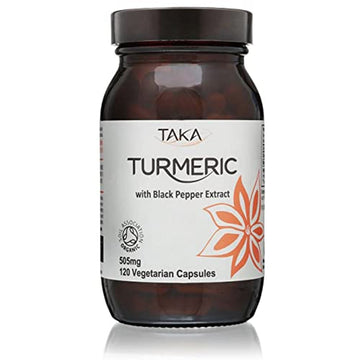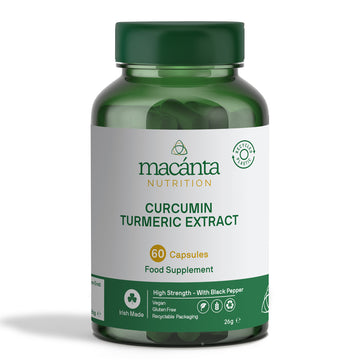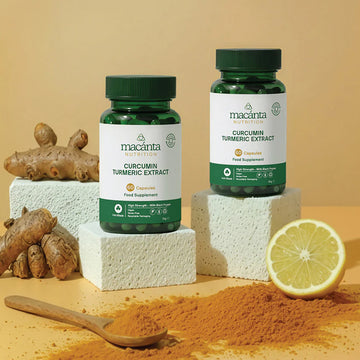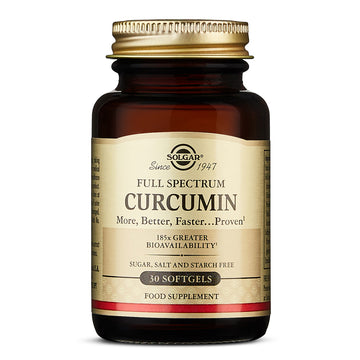When you think of turmeric, you probably think of that lovely distinctive yellow colour it gives curry dishes. But this spice is so much more than just an ingredient for your curry. The health benefits of turmeric are endless. It has received lots of well-deserved attention recently thanks to its health-boosting properties and as a result is popping up in everything from salad dressings to smoothies. But why should you make an effort to add this spice to your diet? And just what are these many benefits? We've got all you need to know below...
What is Turmeric?
Turmeric is a yellow spice that comes from the root of the Curcuma longa plant in Southern Asian. It has a tough, brown outer skin with a deep orange/yellow flesh. Turmeric is most commonly found in powdered form, but is also available as a supplement in tablet, capsule and liquid form. It's an excellent source of manganese and iron as well as vitamin B6, fibre, copper and potassium.
This spice has a unique flavour and aroma. It has a slightly peppery, bitter flavour with a mild aroma similar to ginger and orange. Its distinctive colour is what gives curry and mustard their yellow appearance. But this spice does so much more than just add flavour to your curry dish; it has been used for centuries in Asia for its wide range of health benefits.
What are the Health Benefits of Turmeric?
Turmeric has been used for centuries to treat a huge range of ailments and conditions in Chinese and Indian medicine. Curcumin is the main active ingredient in turmeric and it has many antioxidant and anti-inflammatory properties. This is what helps give turmeric its wealth of potential benefits from helping to keep joints flexible to lowering cholesterol. Check out some of the main health benefits of turmeric below...
Anti-Inflammatory Properties
Turmeric has natural anti-inflammatory properties, which simply means it has anti-swelling and anti-inflammation properties. Inflammation can cause a huge range of conditions in the body, including: menstrual pains, toothaches, bruising, arthritis and high cholesterol. Curcumin - the active ingredient in turmeric - helps the body to lower the enzymes in the body which cause inflammation, which in turn can help treat these conditions.
Antioxidant Properties
Curcumin is also a powerful antioxidant, meaning it has the ability to reduce the damage caused by free radicles. Free radicles damage the cells in the body which can cause a number of diseases. By adding antioxidant rich foods to your diet, such as turmeric (as well as vitamin A, C and E) you are helping the body fight these free radicles, which minimises the damage they can cause.
Aids Weight Management
Turmeric is believed to be an excellent natural weight management aid. This is because the curcumin present can stimulate the gallbladder, which is responsible for bile production. Bile helps the body to digest fat easier and quicker, which helps the body to control weight.
Helps Lower Cholesterol
Curcumin can also have a positive effect on cholesterol. This active ingredient is thought to help the body reduce the build-up of ‘bad cholesterol’, which is also referred to as low-density lipoprotein (LDL), in the blood vessels. This in turn helps reduce the build-up of plaque in the arteries which is what causes high cholesterol, heart attacks and strokes.
Improves Skin
Turmeric has some amazing benefits for your skin because of its antioxidant, antiseptic and antibacterial properties. The antioxidants fight free radicles in the body which contribute to ageing skin. Its antiseptic and antibacterial properties also make it an effective treatment for pimples, breakouts and acne. This spice also adds a wonderful glow to your skin as well as helping reduce the appearance of dark circles, scars and sun spots.
Make a simple and effective face mask using turmeric: simply mix a teaspoon of turmeric, a teaspoon of raw honey and a drop of milk and apply to cleansed skin and allow it to set for 20-30 minutes.
Adding Turmeric to your Diet
There are so many ways to work this earthy spice in to your diet. It’s available in a number of forms but the powdered spice is probably the easiest to use. Add it to the likes of marinades, sauces, salad dressings and even scrambled eggs and grilled meats to add some flavour to your dishes and take advantage of its potential health benefits. This tasty Turmeric Latte is perfect for warming you up in winter too.
It’s also available in supplement form if you’re after a convenient ways to add this spice to your diet and reap some of the health benefits of turmeric. It comes in tablet, capsule and liquid forms so there’s something to suit all needs. Shop turmeric supplements here.
Note* The body can find it difficult to fully absorb turmeric, try consuming it with pepper or a dish containing fat as this will help aid its absorption.
Please note, this blog is for informational purposes only and should not replace medical advice.
It’s always best to consult your doctor before taking any new supplements, treatments or remedies if you are pregnant, breastfeeding or on medication.
Do you want to know more about superfoods? Then read our blog 'The Best Ways to Use Acai Powder'.



















